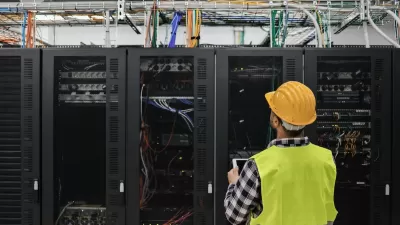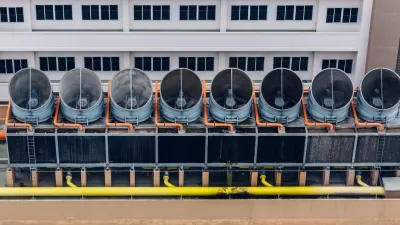Massive data centers are gobbling up energy resources and tax breaks while creating few jobs in the region.

Massive data centers are getting hundreds of millions of dollars in tax breaks in Ohio, reports David Trinko in a piece for Governing.
“The data centers are owned by a mix of consumer-facing brands like Amazon, Google and Meta, plus less familiar names like Quality Technology Services and CyrusOne. While from the outside they may look like large factories, they often employ 20 to 30 or so workers when operational. Some earn tax perks for promising as few as 10 new jobs.” According to Trinko, “The Ohio Department of Development, which until last year was responsible for approving the local property abatements, has refused to say how many local tax deals its officials allowed.”
While the centers don’t bring a significant amount of jobs or economic development, they do require massive energy outlays, “prompting concerns about grid reliability from PJM, operators of the 13-state grid that includes Ohio.” A Goldman Sachs analysis projects a 2.4 percent increase in power demand nationwide after a decade of steady demand, “with nearly 40 percent of that increase attributable to data centers.” By 2030, data centers will use roughly 8 percent of U.S. power resources.
FULL STORY: Ohio Throws Hundreds of Millions to Tech Giants’ Data Centers

Planetizen Federal Action Tracker
A weekly monitor of how Trump’s orders and actions are impacting planners and planning in America.

Congressman Proposes Bill to Rename DC Metro “Trump Train”
The Make Autorail Great Again Act would withhold federal funding to the system until the Washington Metropolitan Area Transit Authority (WMATA), rebrands as the Washington Metropolitan Authority for Greater Access (WMAGA).

The Simple Legislative Tool Transforming Vacant Downtowns
In California, Michigan and Georgia, an easy win is bringing dollars — and delight — back to city centers.

Albuquerque’s Microtransit: A Planner’s Answer to Food Access Gaps
New microtransit vans in Albuquerque aim to close food access gaps by linking low-income areas to grocery stores, cutting travel times by 30 percent and offering planners a scalable model for equity-focused transit.

This City Will Pay You to Meet Your Neighbors
A North Kansas City grant program offers up to $400 for residents to throw neighborhood block parties.

Commentary: Our Silence Will Not Protect Us
Keeping our heads down and our language inoffensive is not the right response to the times we’re in. Solidarity and courage is.
Urban Design for Planners 1: Software Tools
This six-course series explores essential urban design concepts using open source software and equips planners with the tools they need to participate fully in the urban design process.
Planning for Universal Design
Learn the tools for implementing Universal Design in planning regulations.
Smith Gee Studio
City of Charlotte
City of Camden Redevelopment Agency
City of Astoria
Transportation Research & Education Center (TREC) at Portland State University
US High Speed Rail Association
City of Camden Redevelopment Agency
Municipality of Princeton (NJ)





























